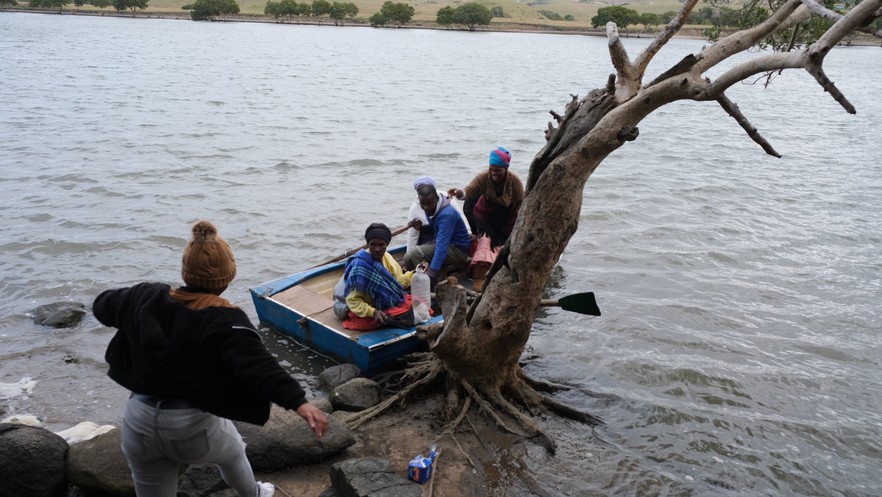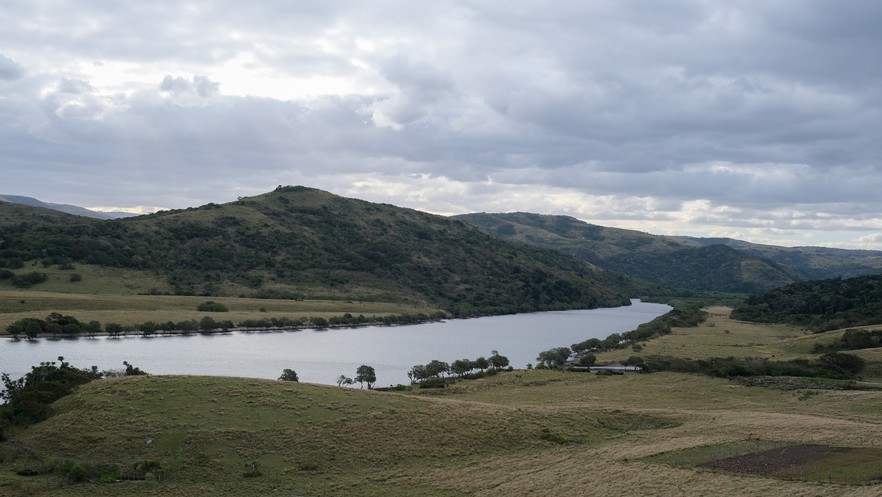This small, solar-powered clinic has greatly improved primary health care for Eastern Cape villagers
Nonprofit Bulungula Incubator’s community-based clinic has brought accessible health care to Xhora Mouth
From this simple, solar-powered, two-room structure, the Bulungula Health Point is able to offer most primary health services. Photos: Daniel Steyn
- For residents of Xhora Mouth in rural Eastern Cape, a trip to the closest government clinic is a day-long journey.
- HIV, TB, high blood pressure, diabetes, and infant mortality are serious issues in the area.
- A nonprofit based in the community has partnered with the government to provide primary health care to more than 450 patients a month.
- The Eastern Cape Health Department says it has an infrastructure backlog of about R25-billion.
Nosizile Bonakele waits on the bank of the Xhora Mouth river at 6am to catch a small rowing boat and begin what will be a day-long journey to access the nearest government clinic.
She left her home at 5:30am. The boat operator asks R20 for a return trip across the river. Then, she will walk two hours to reach the clinic. There she will stand, queuing for several more hours. If all goes well, she will be back at the river by sunset, to return home.
Her alternative is a taxi, but it’s too expensive for her. In case of an emergency, a return trip by private car will cost R800. This is the norm for many people in the rural Eastern Cape.
But in Nqileni village, Bulungula Incubator, a nonprofit organisation, has helped to bring primary health care closer to the community. Staffed by two nurses, a solar-powered health point established in 2012 is open six days a week. It sees more than 450 patients a month.
A small, rickety rowing boat takes people across the river for R20 return trip.
Urgent need for services
A survey conducted in 2011 by Bulungula Incubator found that half the mothers in the community had lost a child because of diarrhoea.
Government policy requires children to receive 16 immunisations, ten doses of Vitamin A, and nine courses of deworming pills before the age of 12. But before the health point was established, parents had to make the long journey to the clinic several times to complete immunisation. Nurses can now administer all immunisations at the solar health point.
Before 2012, treatment and diagnostics for HIV, TB and high blood pressure – the most serious health issues among adults in the community – were only available at government clinics. Patients struggled to adhere to their treatment schedule or they went undiagnosed, leading to preventable deaths.
Having partnered with the Eastern Cape Department of Health, the solar health point is now a fixed outreach point for the Nkanya clinic, and patients are able to pick up their chronic medication for the health point.
Some diagnostic tests can be conducted at the health point, and for more specialised tests, the health point collects samples and delivers them to the Nkanya clinic. The Bulungula Incubator health programme supports over 200 people who are HIV-positive or children of HIV-positive parents.
With solar-powered fridges, the health point is also able to maintain a cold chain for vaccines. During the Covid pandemic, Bulungula Incubator partnered with the government on eight outreach days. Later the health point was approved as an official vaccination site. Because of these initiatives, the vaccination rate in the community is 96%.
Partnering with the department has been key to the sustainability of the health programme. One nurse is employed by the department, medication is provided by the state, and about 75% of the programme is funded by the department.
This is the river that community members in Nqileni village need to cross to get to their nearest government clinic.
Bulungula Incubator also found that access to healthcare and health information is lacking in the area. It therefore runs frequent health workshops at the health point and in schools. It also employs 20 community health workers, called nomakhayas (home-based carers), who visit 450 households per month.
The nomakhayas are trained to monitor patients’ health, provide information and advice, and refer patients to the health point when necessary. They also carry out blood pressure and blood sugar tests and check that people on chronic medication are adhering to their treatment, especially elderly people who often struggle to understand the nurses’ instructions. They then provide feedback on patients’ progress to the nurses at the health point.
For people with disabilities, who particularly struggle to access health facilities, the nomakhayas offer important services, including helping them with exercises for recovery or to ease muscle pain.
The nomakhayas also form an essential part of the Bulungula Incubator Early Childhood Development programme. During their visits, nomakhayas monitor children’s growth, carry out developmental milestone assessments, and ensure that the children receive adequate nutrition and immunisations. They also encourage parents to play with their kids and have conversations with them: simple but often overlooked practices that significantly impact brain development.
Novuyo Mzimeli, site manager for the nomakhayas in Mgojweni village, supervises five nomakhayas who see a total of 59 patients. She says that since she started working for the programme, it has been gratifying to see how patients under her and her colleagues’ care have stopped defaulting on their treatment. She says they often get stopped by residents asking for advice. “We are seen as lifesavers in the community,” she says.
The long-awaited clinic
Only 7% of the patients who visit the health point have to be referred on to government clinics or the local hospital. Having responded to an immediate need for primary health care in the village, the health point has been able to offer almost all clinic services from its two-room structure.
But another government clinic in the area is needed. Sometimes the queues are so long at the clinics that residents get turned away. There are also limitations to what the health point can offer. TB care and HIV patients starting on antiretroviral therapy need to visit the clinic.
Nokuphile Nodanga, a pensioner, said that when the river is in full flow or the wind is strong, they are unable to get to the clinic. “Sometimes we even sleep next to the river,” she told GroundUp.
Bonakele said her son once removed his own stitches because going to the clinic was such a trial.
The Nkanya clinic, on which the health point depends for consumables, medication, and specialised diagnostics and testing, is a five-hour return trip for the Bulungula Incubator drivers.
A new government clinic in Mkhathazo has been in the pipeline for many years. Phumzile Msaro, an independent candidate elected ward 28 councillor in 2021, has been involved in the advocacy for the clinic since 2010, before the health point was established.
Msaro joined forces with SECTION27 and the Human Rights Commission for the initial campaigns for the clinic. Msaro ensured that the clinic got written into the Integrated Development Plan (IDP) for the municipality. This forced the health department to come to the table, he told GroundUp.
Spokesperson for the Eastern Cape Department of Health Yonela Dekeda said the aim is to have a contractor on site by the end of March 2023.
Lynn Wilkinson, public health expert and board member of Bulungula Incubator, said the new clinic will be able to serve more villages than the health point. Because the clinic is being built from scratch, there is a big opportunity for integration and partnership with the health point from the start, she said.
Building sufficient health infrastructure to meet demand is an ongoing challenge for the Eastern Cape Health Department. Dekeda said the department is faced with an infrastructure backlog of R25-billion and only receives R1.4-billion annually, and of that 60% is for maintenance.
See also: This project has transformed education in a remote part of the Eastern Cape
Next: Mbalula must protect Intercape buses, court rules
Previous: More than two years since construction started, toilets remain incomplete in Free State village
© 2022 GroundUp. This article is licensed under a Creative Commons Attribution-NoDerivatives 4.0 International License.
You may republish this article, so long as you credit the authors and GroundUp, and do not change the text. Please include a link back to the original article.
We put an invisible pixel in the article so that we can count traffic to republishers. All analytics tools are solely on our servers. We do not give our logs to any third party. Logs are deleted after two weeks. We do not use any IP address identifying information except to count regional traffic. We are solely interested in counting hits, not tracking users. If you republish, please do not delete the invisible pixel.





